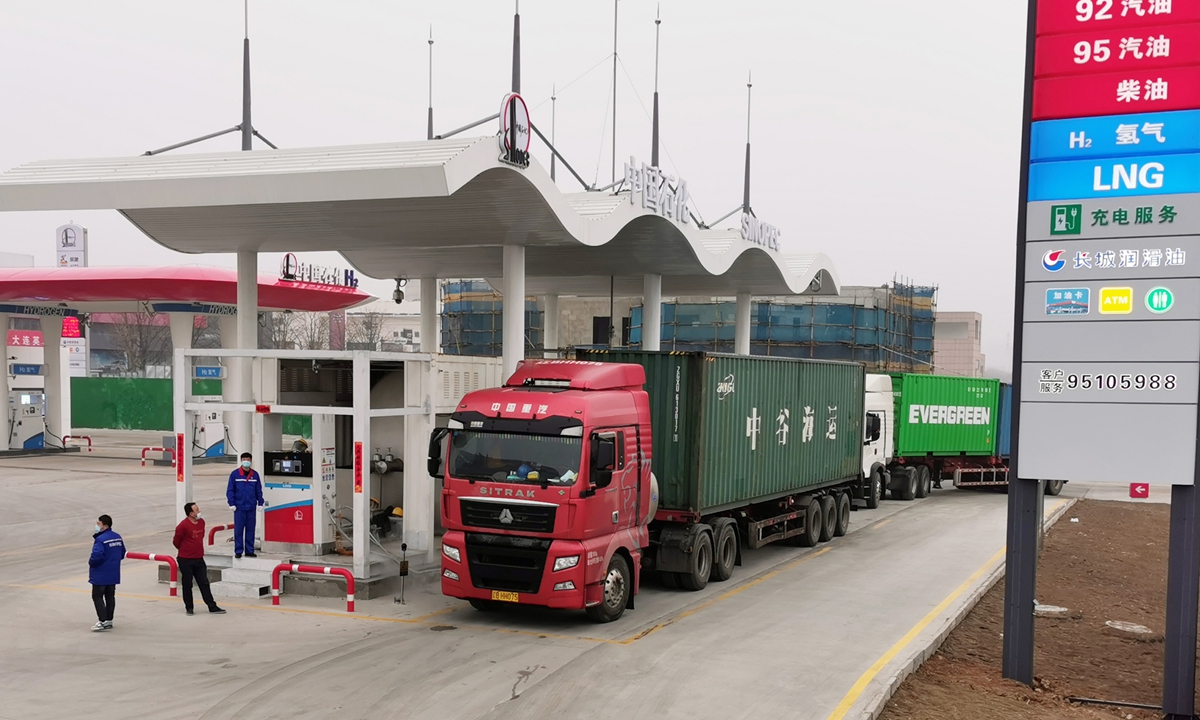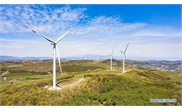
A truck parks inside a new fuel station that provides refills and recharges for a wide variety of energy sources. The station, opened by state-owned oil major Sinopec in Dalian, Northeast China's Liaoning Province Sunday, is first of its kind in the region. It provides hydrogen refilling, electricity charging and natural gas refilling, in addition to gasoline, as China diversifies toward a greener energy mix. Photo: VCG
LONGi Green Energy Technology, a major Chinese manufacturer of photovoltaics and a developer of solar projects has announced its entry into the hydrogen industry last week, joining a number of car plants and state-owned energy enterprises to ignite a market of tens of trillions yuan as China steps up the industries toward promising source of renewable energy.
The China Hydrogen Alliance predicts that by 2025, the output value of China's hydrogen energy industry will reach 1 trillion yuan ($152.6 billion) and by 2030, China's demand for hydrogen will reach 35 million tons, accounting for at least 5 percent of China's terminal energy system.
By 2050, hydrogen energy will account for more than 10 percent of China's energy system, and the annual output value of the industrial chain will reach 12 trillion yuan, as the new leading economy growth pole.
Policy push
China has been stepping up investments in hydrogen energy with central and local government policy guidance to explore the hydrogen industry which has been inked in the country's 14th Five-Year Plan 2021-25 as one of the six future industries along with rechargeable batteries.
At present, more than 10 provinces and municipalities and more than 40 cities and counties have issued special policies to support hydrogen energy industry.
Last Wednesday Beijing issued a guidance to boost hydrogen energy. The capital plans to add 37 new hydrogenation stations by 2025 and build a hydrogen energy industrial chain in Beijing-Tianjin-Hebei integration region worth more than 100 billion yuan, according to the Beijing hydrogen fuel cell vehicle industry development plan (2020-2025).
The upcoming Beijing 2022 Winter Olympic Games is seen as a major opportunity to demonstrate the development.
On Saturday the second phase of Yanqing hydrogen energy industrial park was officially kicked off at Beijing Winter Olympic Games competition area. The project will become one of the hydrogen transport infrastructure in Yanqing District, providing gas supply for 150 hydrogen fuel vehicles during the Winter Olympic Games.
Booming Industry
Many domestic automobile companies and players in transportation fields are actively laying out their hydrogen fuel cell plans.
Great Wall Motor has recently announced to accelerate the layout of hydrogen fuel cell vehicles, following SAIC, FAW Haima Automobile, GAC Group.
In a statement sent to the Global Times on Monday the Chinese automaker said it will invest a further 3 billion yuan in the research and development of hydrogen energy in the future and is to launch world's first class C hydrogen fuel cell SUV this year. It also aims to deploy a high-end passenger vehicle service team during the winter Olympics in 2022 and become the top three in global hydrogen market by 2025.
A key component of the industry, hydrogenation station is an important breakthrough in the industrial chain.
As of November 21, 2020, China ranked second in the number of hydrogenation stations with a total of 88 versus a total of 458 hydrogenation stations have been built in the world.
Sinopec, the Chinese state-owned oil producer is also accelerating hydrogen energy development.
The company said in a statement to the Global Times on Monday that it plans to build 100 hydrogen refueling stations this year, which will be expanded to 1,000 by the end of 2025, providing hydrogen supply and hydrogen station operation for Winter Olympic Games hydrogen fuel cell vehicles.
CITIC Securities expects that in the next 10 years, hydrogen consumption in the transportation fields such as fuel cell commercial vehicles and ships will increase 40 percent.
It is expected that by 2050, demand for hydrogen energy will exceed 180 million tons, expanding by nearly 8 times, according to CITIC.
Accordingly, by 2050 the number of hydrogenation stations is expected to reach 10,000 according to a white paper on China's hydrogen energy and fuel cell industry.
Challenges
While China, with its massive resources, is among the best-positioned to lead the drive for hydrogen energy, the high cost of storage and technological challenges still restrict the large-scale commercial development of hydrogen industry in the near future, analysts noted.
"One of the major barrier is to reduce the cost. At present, the source of clean hydrogen energy is mainly produced by electricity, making it more expensive to generate," Han Xiaoping, chief analyst at energy industry website china5e.com told the Global Times on Monday.
Lin Boqiang, dean of the China Institute for Studies in Energy Policy at Xiamen University also noted that there remain technology barriers such as storage and transportation, making it difficult to apply the new energy on a large scale.
Experts said although the industry is in its infancy, China's explore on the hydrogen energy is more of an investment to the future to keep its technology advancement in the world.
"As the future energy, it is estimated that there can be a large market and adaption in 10 years' time with the decrease of cost and the increase of output," Han said, noting that China's advantages lie in its resilience in long-term investment, the involvement of state-owned, private and foreign capitals, talents resources and the huge market itself.
"It is predicted that the hydrogen energy will be used in marine and low altitude intelligent flight due to its high energy density in the next 10 years. Compared with rechargeable battery, hydrogen energy can leash more energy which has a great space for large-scale application in the future," he said.



